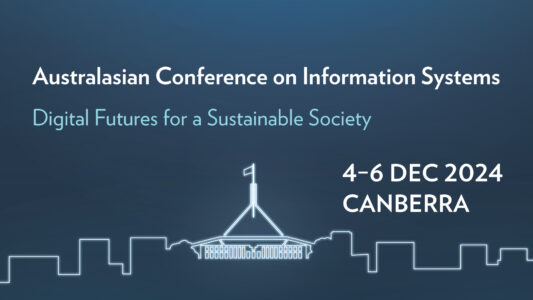The Australasian Conference on Information Systems (ACIS 2024) was hosted by the University of Canberra in Canberra, the capital of Australia, from 4 December to 6 December 2024. In its 35th year, the Australasian Conference on Information Systems is the premier conference on the Information Systems discipline in the Australasian region.
Digital Futures for a Sustainable Society
Building digital futures for a sustainable society involves utilizing technology to address environmental, social, and economic challenges while ensuring that the benefits are inclusive and equitable. As technology advances and organizations transform, the need to integrate sustainability principles into digital practices is even more critical. Technologies for the future need to be built according to regenerative designs to improve economic resilience, foster digital sovereignty, and achieve social equity.
By combining digital solutions with sustainable practices, societies can work towards a more resilient, effective, and inclusive future. It is crucial to prioritize ethical considerations, regenerative principles, data privacy, and security to ensure that the implementation of digital technologies aligns with sustainability principles.
The Australasian Conference on Information Systems (ACIS 2024) was hosted in Canberra, the capital of Australia, from 4 December to 6 December 2024. Canberra, which means “the meeting place” in the local Ngunnawal language, is one of the world’s most sustainable cities. Attendees from around the globe came together in Canberra to share research insights and perspectives about how digital technologies can promote sustainability and facilitate a resilient economy that works for the common good.
Submissions from 2024
LLM Driven Approach for Capability Modelling with Context-enriched Prompt Engineering, Iromie Samarasekara, Madhushi Bandara, Fethi Rabhi, Boualem Benatallah, and Rouzbeh Meymandpour
Development of Information System Guided Logistics and Supply Chain Models: Connecting Stakeholders for Sustainable Seed Ecosystem Management, Amboge Samson and Shastri Nimmagadda
"It makes my life worthwhile": Digital inclusion, digital equity, and digital justice for people with disabilities., Lara Sanderson, Jennifer Campbell-Meier, Anne Goulding, and Allan Sylvester
A New Approach for Conceptualising IT Project Portfolio Management for Sustainable Results, Hamed Sarbazhosseini, Mahtab Mohtasham Khani, and Sahber Monshizada
Towards Design Principles for Governance of Complex Multisourcing in IT services ecosystem, Biju Krishna Pillai S, Anup Shrestha, and Fiona Russo
AI Systems and their Scalability – A Systematic Literature Review, Erik Scepanski and Sonja Zillner
The Domestication of ChatGPT by University Students, Dylan Sebastian and Maureen Tanner
Developing a predictive model for COVID-19 in Uganda, Stuart Sebiranda, Peter Busch, and Stephen Smith
Integrating Traditional and Agile Project Management Approaches: An Exploration into Hybrid Approaches, Thilinie Seimon, Mike Seymour, and Sebastian Boell
Deciphering Drone Delivery Rejection: Investigating Public Perception and Regulatory Implications through an Augmented Human-Robot Interaction Framework, Ravi Varman Selvakumaran and Damith Herath
Explaining the possible negative effects of big data through the interplay between big data analytics, governance, and privacy: A Socio-technical analysis, Akhtar Muhammad Shah, Humza Naseer, and Samar Fatima
Exploring Attachment and Trust in AI Companion Use, Phoebe Sharpe and Raffaele F Ciriello
A Comparative Study of Coursera and edX on Unveiling the Enigma of MOOC Platforms' Signalling Effects: A Mixed-Method Approach, Yingnan Shi and Astrid Tong Xu
From Enthusiasm to Fatigue: Exploring Reduced Use and Gratification Dynamics in Intelligent System Collaboration, Yingnan Shi and Astrid Tong Xu
Transforming Resources to Operationalize Analytics: An Empirical Investigation, Abhinav Shrivastava, Humza Naseer, Stuart Black, Booi Kam, Yee Ling Boo, and Kok-Leong Ong
Prompt Design for Monetary Policy: An LLM-Based Sentiment Analysis for Macroeconomic Decision-Making, Vivian Olivia Frederica Simanjuntak, Fania Velni, and Richard Wiputra
AI-Enabled Diabetic Foot Care: A Cloud-Based IoT Ecosystem for Real-Time Monitoring and Recommendation, Azad Singh, Neel Mani, Shastri Nimmagadda, and Devanshu Sharma
Mitigating Uncertainty and Enhancing Trust in AI: Harmonizing Human-Like, System-Like Features with Innovative Organizational Culture, Dheeraj Singh and Shalini Chandra
Generative AI-powered knowledge management in education: A dual perspective of design and use, Himanshu Singh, Yunfei Shi, and Christine Van Toorn
Adoption of Construction 4.0 technologies to improve Organizational Resilience: A conceptual framework, Yogaraj Sivapragasam, Hamed Sarbazhosseini, and Blooma John
Promises and Pitfalls: Evaluating Generative AI Tools in Software Engineering, Srinivas Subramanya and Anindita Paul
Intentions and Triggers: Why People Become Digital Nomads, Jacinda Suherly, Sam Kirshner, Michael Cahalane, and Daniel Schlagwein
Blockchain Functional Business Value: Insights from Food Supply Chain Use Cases, Jakia Sultana, Say Yen Teoh, and Chin Eang Ong
The Influence of Financial Lending App Usage on Risky Credit Behavior: A View from Mental Accounting and Social Capital, Bingren Sun and Yiyang Bian


